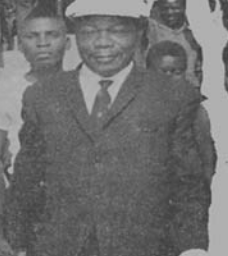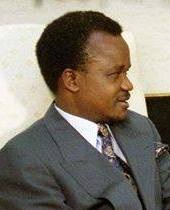
Kenneth David Kaunda, also known as KK, was a Zambian politician who served as the first president of Zambia from 1964 to 1991. He was at the forefront of the struggle for independence from British rule. Dissatisfied with Harry Nkumbula's leadership of the Northern Rhodesian African National Congress, he broke away and founded the Zambian African National Congress, later becoming the head of the socialist United National Independence Party (UNIP).
The history of Zambia experienced many stages from colonization to independence from Britain on October 24, 1964. Northern Rhodesia became a British sphere of influence in the present-day region of Zambia in 1888, and was officially proclaimed a British protectorate in 1924. After many years of suggested mergers, Southern Rhodesia, Northern Rhodesia, and Nyasaland were merged into the British Federation of Rhodesia and Nyasaland.

The politics of Zambia takes place in a framework of a presidential representative democratic republic, whereby the president of Zambia is head of state, head of government and leader of a multi-party system. Executive power is exercised by the government, while legislative power is vested in both the government and parliament. Formerly Northern Rhodesia, Zambia became a republic immediately upon attaining independence in October 1964.

The Zambian Defence Force is the military of Zambia. It consists of the Zambian Army, the Zambian Air Force, and the Zambia National Service. The defence forces were formed at Zambian independence on 24 October 1964, from constituent units of the dissolved Federation of Rhodesia and Nyasaland Armed Forces. During the 1970s and 1980s, it played a key role in a number of regional conflicts, namely the South African Border War and Rhodesian Bush War. Being a landlocked country Zambia has no navy, although the Zambian Army maintains a maritime patrol unit for maintaining security on inland bodies of water.

The president of Zambia is the head of state and the head of government of Zambia. The office was first held by Kenneth Kaunda following independence in 1964. Since 1991, when Kaunda left the presidency, the office has been held by seven others: Dr. Frederick Chiluba, Levy Mwanawasa, Rupiah Banda, Michael Sata, Edgar Lungu and the current president Hakainde Hichilema, who won the 2021 presidential election. In addition, acting president Guy Scott served in an interim capacity after the death of President Michael Sata.

The prime minister of Zambia was the head of government of Zambia. From 1973 to 1975, Mainza Chona was the first person to hold the position following independence from the United Kingdom.

The United National Independence Party (UNIP) is a political party in Zambia. It governed the country from 1964 to 1991 under the socialist presidency of Kenneth Kaunda, and was the sole legal party in the country between 1973 and 1990. On 4 April 2021, Bishop Trevor Mwamba was elected President of UNIP.
Mainza Mathias Chona was a Zambian politician and founder of UNIP who served as the third vice-president of Zambia from 1970 to 1973 and Prime Minister on two occasions: from 25 August 1973 to 27 May 1975 and from 20 July 1977 to 15 June 1978.
Alice Lenshina (1920–1978) was a Zambian woman, prisoner of conscience and self-appointed "prophetess" who is noted for her part in the "Lumpa Uprising", which claimed 700 lives.

Harry Mwaanga Nkumbula was a Zambian nationalist leader involved in the movement for the independence of Northern Rhodesia, as Zambia was known until the end of British rule in 1964. He was born in the village of Maala in the Namwala district of Zambia's southern province. He was the youngest of three children and the only son.
Simon Mwansa Kapwepwe was a prominent Zambian politician, anti-colonialist, and author, born on April 12, 1922. Kapwepwe made significant contributions towards Zambia's struggle for independence, working tirelessly towards achieving the country's liberation from colonial rule.

The Zambia Independence Act 1964 was an Act of the Parliament of the United Kingdom which granted independence to Zambia with effect from 24 October 1964. It also provided for the continuation of a right of appeal from Zambia to the Judicial Committee of the Privy Council. It was introduced by Andrew Cavendish, 11th Duke of Devonshire Under-Secretary of State for Commonwealth Relations
Christianity has been very much at the heart of religion in Zambia since the European colonial explorations into the interior of Africa in the mid 19th century. The area features heavily in the accounts of David Livingstone's journeys in Central Africa.
Tilyenji Kaunda is a Zambian politician. Until 5 April 2021 he served as leader of the United National Independence Party (UNIP)
Reuben Chitandika Kamanga was a Zambian freedom fighter, politician and statesman. He was educated at Munali Secondary School.

General elections were held in Northern Rhodesia on 20 and 21 January 1964. There were two voter rolls for the Legislative Council, a main roll that elected 65 seats, and a reserved roll that elected 10. Africans elected the main roll, whilst Europeans elected the reserve roll. Other ethnicities were allowed to choose which roll to be part of. The United National Independence Party won the elections, taking 55 of the common roll seats. Its leader, Kenneth Kaunda became Prime Minister, leading the country to independence in October that year, at which point he became President. Voter turnout was 94.8% for the main roll and 74.1% for the reserved roll.

General elections were held in Zambia on 31 October 1991 to elect a President and National Assembly. They were the first multi-party elections since 1968, and only the second multi-party elections since independence in 1964. The United National Independence Party (UNIP), which had led the country since independence, was comprehensively beaten by the Movement for Multi-Party Democracy (MMD). Kenneth Kaunda, who had been president since independence, was defeated in a landslide by MMD challenger Frederick Chiluba in the presidential elections, whilst the MMD won 125 of the 150 elected seats in the expanded National Assembly. Voter turnout was 45%.
Jethro Mukenge Mutti, was a Zambian politician who between the years 1964 to 1975 served as member of parliament, Ambassador, Minister and Member of the Central Committee under the ruling party UNIP led by Kenneth Kaunda. He died on 18 January 2013 after complications from aspiration pneumonia following a series of mini strokes and poor health in the last few years of his life, linked to his tetraplegic condition.

Beatrice "Betty" Kaunda, was a Zambian educator and inaugural First Lady of Zambia from 1964 to 1991 as the wife of the country's first president, Kenneth Kaunda. She was known as Mama Betty Kaunda and the Mother of Zambia by Zambians.
Sikota Wina was a Zambian politician. He was a member of the Legislative Council and the National Assembly and the country's first Minister of Health. He also held the posts of Minister for Local Government and Minister of Information, Broadcasting and Tourism.











